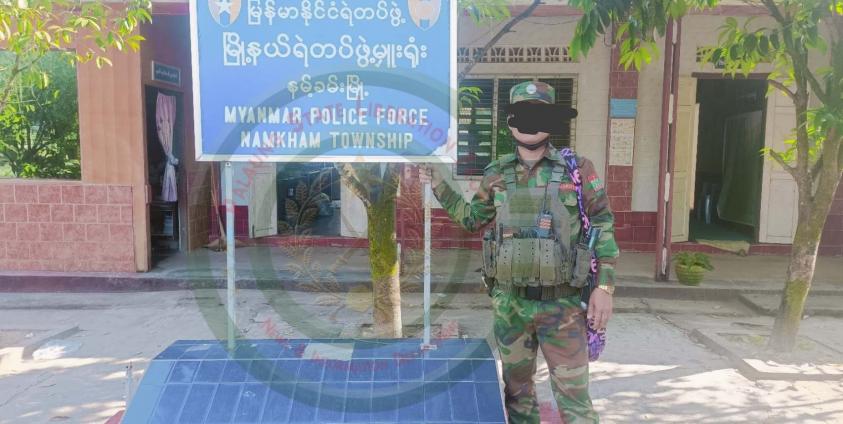In the northern Shan State conflict, Senior General Min Aung Hlaing the junta chief, pinned the blame on the police for all the Military Council camps, police outposts, and police stations being captured.
The National Defense and Security Council, usually convened after the conclusion of a state of emergency, was called on November 8 due to the repercussions of Operation 1027. During the meeting, the military leader discussed the combat against drugs and enhancing the capacity of the police.
He stated that the primary issue in northern Shan State stems from drugs, pointing out that the armed revolution power is driven by the revenue generated from narcotics, and emphasized his commitment to strengthening the police's capabilities to eradicate the drug menace.
Bringing up drugs as the driving force of the revolutionary surge of ‘Operation 1027’ is a red-herring ‘ distraction from political reality. It is also a distraction from their own well-documented role in the drug trade with Tatmadaw battalions being deeply immersed in taxing opium, heroin and Ya -Ba trafficking over many decades in the Shan State.
Air Force Captain Zay Thu Aung, a participant in the Civil Disobedience Movement (CDM), informed Than Lwin Times that the military leader is blaming the police for the capture of police stations and administrative offices. However the CDM military expert pointed out the police are not a fighting force.
"The loss of police stations and administrative offices in the northern Shan State battle is attributed to the poor performance of the police, with blame directed towards them. But they are not soldiers; they are not a combat force. Their methods of operation and the military's approach differ significantly," he remarked.
He also pointed out that following the coup, the police were compelled to fight alongside the soldiers, resulting in higher casualties for the police due to their lack of skills compared to the soldiers.
On November 3, amidst the battle to seize control of the Min Ywar police station in Gangaw Township, Magway Region, a policeman requested air support from a superior officer amid the gunfire. However no air support arrived until the entire camp had been captured.
According to the National Unity Government's Ministry of Defense, six fatalities occurred in the battle, including the policeman who had sought air support.11 individuals surrendered as prisoners of war, and four people left the camp and fled.
Due to the coordinated offensive by the Kachin Independence Army (KIA) and joint forces of armed resistance, including the Three Brotherhood Alliance, military camps and administrative offices are continuously being captured not only in northern Shan State, but also in Sagaing, Magway, and other regions.
In this situation, military analysts point out that the Military Council is unable to increase the capacity of the military, which is facing a decline in both combat effectiveness, morale, and manpower. At the same time, it is deemed impossible to enhance the capacity of the police.
Former Police Sergeant Ko Aye Min Tun K, who is in charge of the People's Defense Force (PDF) in Thaton District and has joined the Civil Disobedience Movement (CDM), shared with Than Lwin Times that "The coup leader blamed the current situation is a result of the inadequate performance of the police. Prior to the coup, eligibility to join the police required passing the ninth grade. However following the transition from the military to the police, both the quality and performance of the police force have declined. This deterioration is largely attributed to the changes within the Military Council. Soldiers who joined after this transformation are also deemed unqualified. A significant number of individuals have shifted from the military to the police," he explained.
After the military coup, Myanmar's police force came entirely under the military , with Lieutenant General Ni Lin Aung, the Deputy Minister for Home Affairs, appointed as the chief of police.
On March 25, the Military Council revised the Myanmar Police Law, mandating that police officers must fulfill duties in law enforcement, community peace, and, when necessary, national defense and security.
Amid the revolutionary attacks by armed resistance forces, the Military Council is deploying both soldiers and policemen to the frontlines, as they are confronted with multiple war fronts across the country following the coup.
Furthermore, both police officers and military personnel have been assigned to serve in police stations in regions where regional security is a concern, and similar processes are occurring in administrative offices as well.







